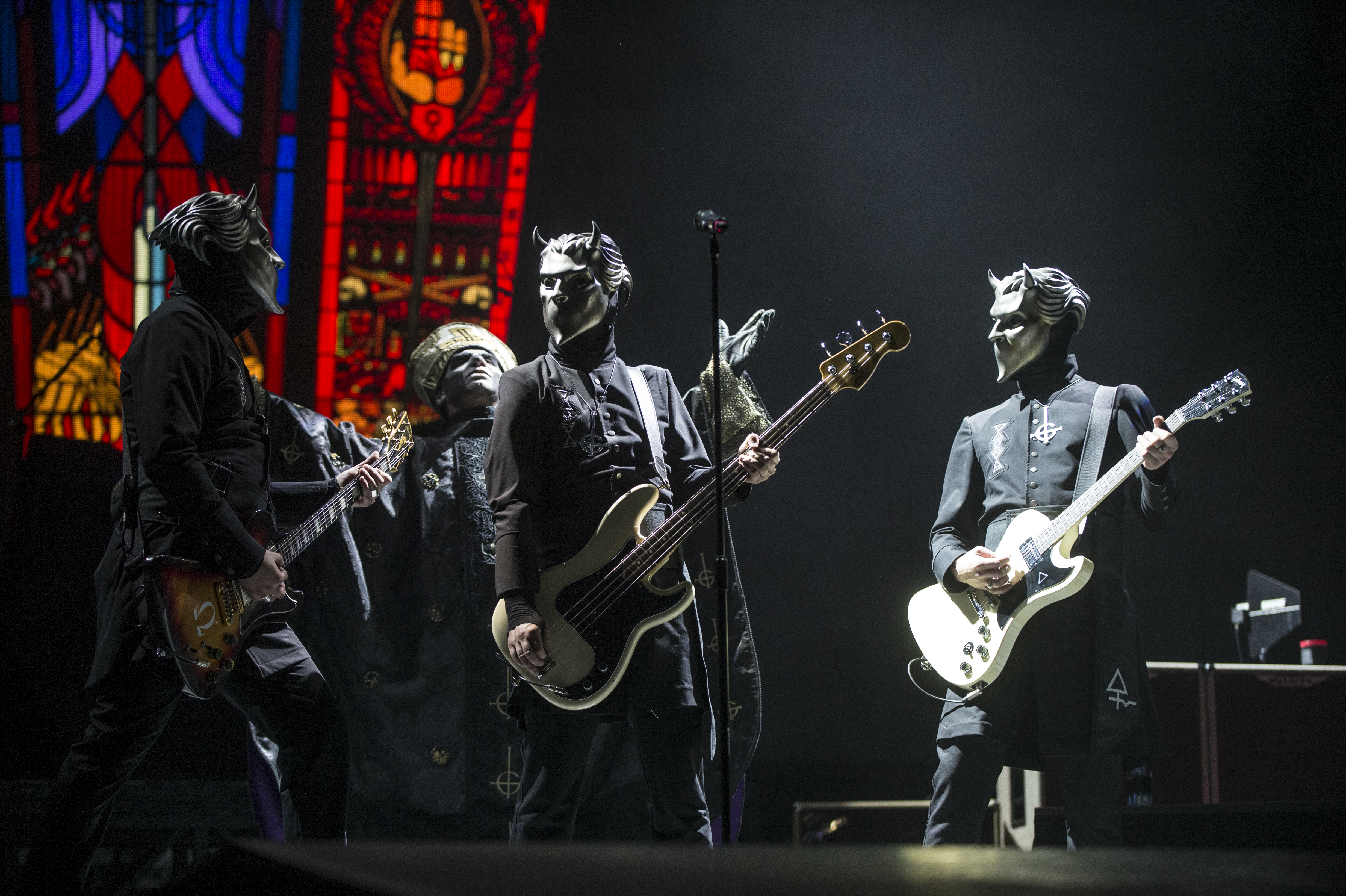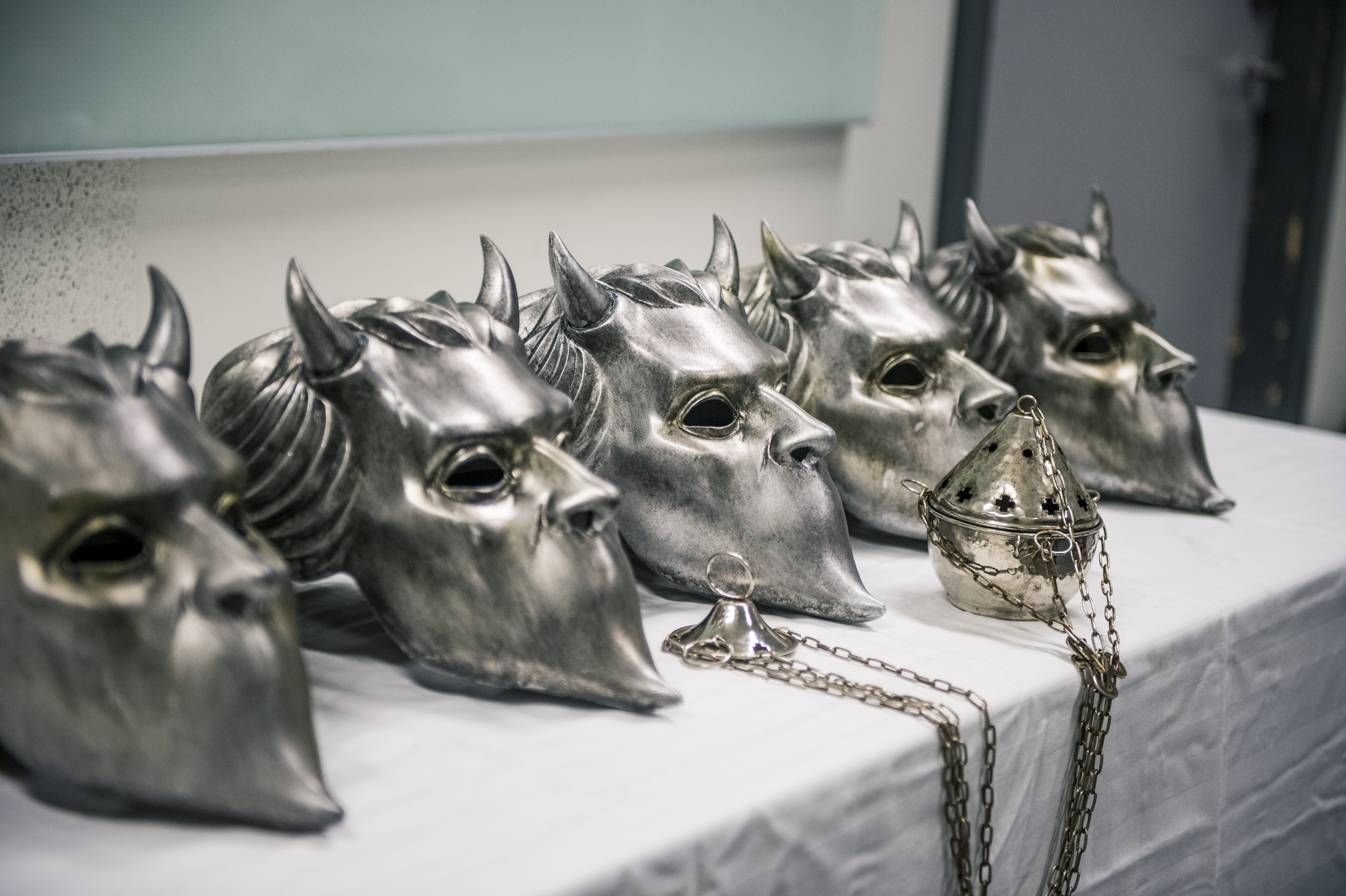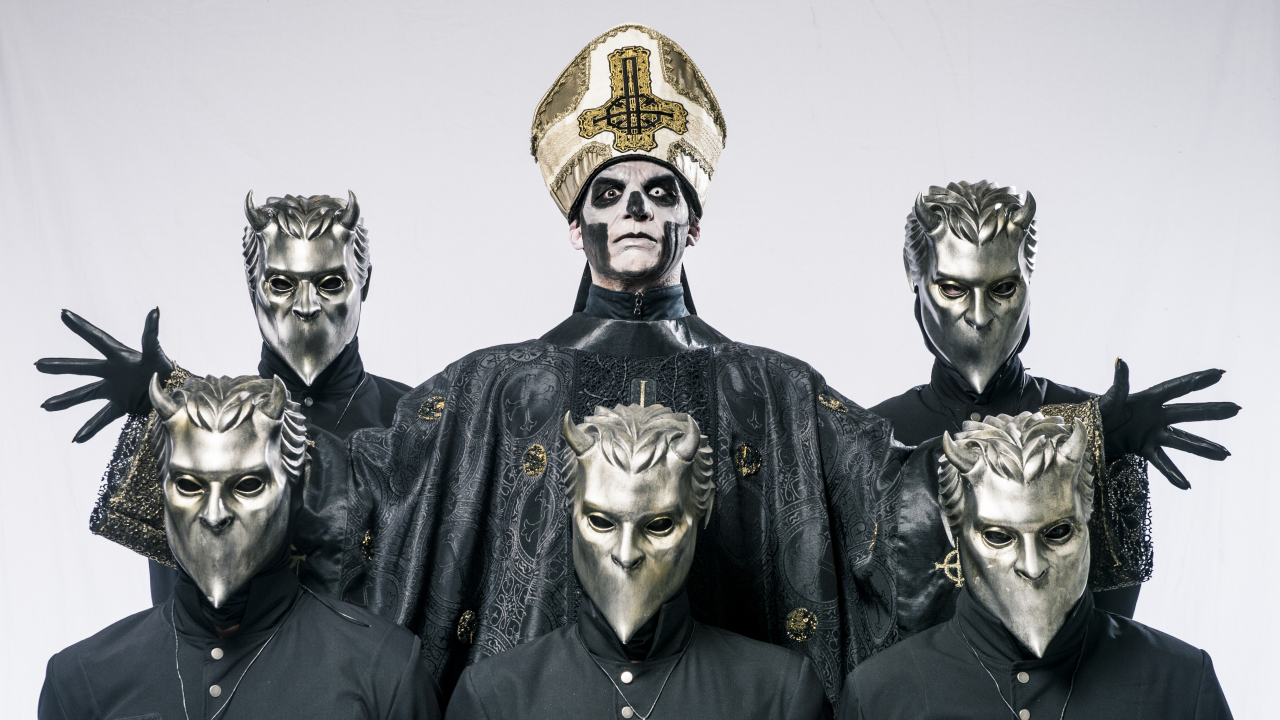A figure dressed in black clerical robes stands on stage illuminated by a single spotlight, his features contorted into a mocking grin. “Oslo, you are not idiots, are you?” he teases, addressing the 20,000-strong audience gathered before him in the darkness. “I think you are not idiots. So you can follow my words, right?”
As the silver-masked, black-garbed band behind him strike up a dense, distorted, circular riff, Papa Emeritus III begins to sing in a rich, mellifluous baritone. ‘Come together,’ he intones. ‘Together as one. Come together. For Lucifer’s son.’
As the chorus echoes around the cavernous Telenor Arena, the chant is taken up by those closest to the walkway on which the singer stands. At first there are maybe 100 voices joined in communion with the satanic priest, then the choir is 1,000-strong, their voices louder and bolder. The volume redoubles as the frontman extends his arms, palms upwards, and gestures for more. Soon enough the whole room is united in song, eyes glazed, fists pumping the air. The masked men lay down their instruments and exit into the shadows. And still the chant resounds: ‘Come together. Together as one. Come together. For Lucifer’s son.’ Blowing kisses to his congregation, Papa Emeritus III bows theatrically and allows himself a smile. His work is done here.
Earlier, in the hours before showtime, there’s no trace of Papa Emeritus III in the backstage area of Oslo’s premier sports and entertainment arena. Indeed, the only manifestation of Ghost’s presence here at all is in the form of five burnished silver masks and a gleaming metallic thurible, sitting on a long wooden table in a dressing room in the bowels of the complex. Hirsute men in black T-shirts and jeans ferry guitars and flight cases in and out. Save for the soft tap of fingers upon a laptop computer, all is quiet and calm. Eerily so. “Papa is not here,” a lightly accented voice explains. “He comes when showtime comes. He does not socialise with us. He does not speak with us. That’s just the way of things, the way it must be.” The speaker is one of Ghost’s number, a ‘Nameless Ghoul’ as their album sleeves dictate. The musical mastermind behind Ghost may have been identified on social media – and indeed previously in the pages of this magazine – but, we’re going to make like it’s Kiss in the 70s or the early days of Slipknot and go along with the charade. Irrespective of any obfuscation, however, the task of explaining the occult rockers’ credos, motivations, aspirations and desires has fallen to this man as the band’s cult has expanded.

Ghost are in Oslo today at the behest of their friend (and sometime musical collaborator) Dave Grohl, an avowed fan, as the supporting act to his own band the Foo Fighters. In 48 hours’ time the sextet will face down some 65,000 Foos fans at a show in Gothenburg’s Ullevi Stadium (soon to pass into infamy when Grohl tumbles from the lip of the stage and fractures a bone in his right leg, throwing the Foos’ summer touring plans into chaos). It’s a quite remarkable opportunity for the underground metal band, and this afternoon the affable, softly spoken Ghoul makes no attempt to disguise his wonder at the scenario. “This is not what normally happens,” he admits. “With this band we got a chance that musicians don’t normally get in their late twenties. When we started out, our ambitions were very modest, and there’s been so many factors in our success that we couldn’t possibly have planned for. We were so close to not becoming this. And now we want to create our own little kingdom.”
The Ghost story began in the autumn of 2010 when a Swedish music journalist was taken, blindfolded, to a warehouse in woodland on the outskirts of Linköping, Sweden and confronted by a troupe of hooded figures. Their leader, a skeletal figure in robes and a bishop’s mitre, announced himself as Papa Emeritus, and declared himself on a mission to “disgust, arouse and enlighten” the masses. Ghost’s debut album, 2010’s Opus Eponymous, released by UK independent label Rise Above, was a smartly crafted, cinematic, minor-key masterpiece, undeniably indebted to Blue Öyster Cult and Mercyful Fate, but which possessed a dark, subversive charm all its own. In the US a major-label bidding war ensued, after which Ghost’s second album, 2013’s Infestissumam, was released on a Universal Records imprint headed up by industry heavy hitter Tom Whalley, who had signed acts such as Marilyn Manson, Primus and Helmet during his time at Interscope Records. Metallica and Iron Maiden took the band on tour, Down frontman Phil Anselmo declared himself a fan, and Dave Grohl went one step further by producing, and playing on, Ghost’s covers EP If You Have Ghost. Our man humbly acknowledges today the debt they owe to “Phil and James [Hetfield] and Dave and all these people advocating the band”. But with the release of their forthcoming album Meliora in August, it’s the band’s fervent wish that Ghost will soon be able to stand on their own cloven feet. “People might say: ‘You can never be the next Metallica or Iron Maiden because their legacy is too huge.’ And I understand and respect that,” he states. “But if you look at a band like Rammstein, they’re this big, special, autonomous behemoth who bring an incredible experience each time they step on stage. And I think that’s an aim for us. That – in the best of worlds – is what we could become.” There is, of course, much work to be done before then. In their native Sweden, Ghost might be a household name – Infestissumam was a No.1 album there – but elsewhere the band remain a (growing) cult concern. Indeed, our interviewee readily acknowledges there’s every chance that some_ Classic Rock_ readers might have gazed upon the face of Ghost and dismissed this unusual, idiosyncratic band as a joke, a gimmick, a schlocky parody of 70s rock. The most frequent comment he hears in connection to the band is: “I didn’t care for your band, but then I actually heard you…” Ghost’s non-traditional set-up may be confusing – “Believe me, it confuses us too,” he laughs – but there’s a genuine and undeniable heart and soul to the band beneath their dramatic presentation. Of course, much of the mystery behind them could simply be dispelled by having their frontman address fans and media directly. But this, says our Ghoul, will never happen. “We never intended to have Papa speak,” he insists. “That’s one of the biggest misconceptions of the band. We are not like any other rock band. Sometimes journalists take offence at that, and are like: ‘We need to talk to the main guy.’ But if there’s a new production of Phantom Of The Opera opening in Birmingham, would you request an interview with the Phantom, rather than Andrew Lloyd Webber? Papa doesn’t care for doing interviews, and he never will. And if that’s hard for people to understand, then that’s too bad.”

Ghost’s current frontman, Papa III, has “no actual DNA connection” to the band’s original frontman, though he is apparently the younger sibling of Papa II, we are told. But the band’s mission – to gather the masses to er, black masses – remains unwavering. There’s an insistence that in order for Ghost to grow in stature and influence, they simply must evolve. “Obviously the Catholic faith relies on a succession of popes, and from a strictly theatrical point of view – and from a fan point of view – I’ve always been in awe of bands that go through changes when they go into a new era, whether that’s Alice Cooper or Kiss or Iron Maiden or even Pink Floyd,” he says. “I like that just seeing one picture of a band on stage allows you to see immediately what era it was. When the idea of Ghost came, the mindset was: ‘If this is going to be an anonymous band, we’re not going to give away a lot of personal information, so there needs to be a sense of eras.’ Because if we were just to do the same thing all the time, it could quickly feel stale.” This evolution, however, has its limits. Ghost may take on different personas, but the group promise they will never truly shed their outer skin.“Unmasking has never been part of our plan,” he insists. “As far as anonymity goes, we have for years been completely comfortable with the idea that anonymity won’t last, because every step that you take towards being a bigger band, you take another step away from being anonymous. In a sense, the worst thing that could happen to us in terms of anonymity would be the prospect of us having real mainstream success. If we were to have a No.1 record in the US or UK, I’m sure that would be that, in terms of people allowing us to stay faceless. But it takes a hell of a lot of effort to make anyone a household name. So if anyone wants to make the effort of ‘exposing’ us, it wouldn’t change much, I think, because people don’t care.”

And this is surely the crux of Ghost’s popularity: their audience buy wholly into the group dynamic, and simply refuse to allow outsiders to dismantle the carefully constructed façade the band have erected. For those so inclined, it would only take a few minutes of internet research to unmask them and their charismatic leader, but where’s the real pay-off in that? It’s this willing suspension of disbelief, this enthusiastic opt-in to the group’s mystique, that makes Ghost such a compelling, intoxicating proposition. And the question of whether that mystique will translate to an arena full of Foo Fighters fans on a nondescript Wednesday evening becomes irrelevant once Papa Emeritus stalks boldly from the wings on to the Telenor Arena’s stage. “When we step in front of a crowd who’re unfamiliar with us, we usually have their attention at least,” the musician states confidently ahead of show time. “A lot of bands are merely a distraction ahead of the main event, but I think we make people focus and watch. And once we have people’s attention, we also have the muscle and the songs to actually win people over.” That much is evident from the group’s 45 minutes on stage tonight. For with each passing moment, you can tangibly feel the affection for Ghost grow among this mainstream audience. Hearteningly for the band, it’s two new songs from Meliora – Absolution and new single _Cirice – which bring the loudest cheers, suggesting that there is so much more to come from the group, who’ve clearly transcended criticisms of being simply a one-trick gimmick. Afterwards, when Classic Rock_ visits the band’s dressing room, Papa Emeritus III has already disappeared into the night. But fresh from the shower, our Ghoul is quietly buzzing about his band’s latest triumph. “You would have to be dead not to appreciate such an evening,” he says with a knowing smile. “I think this was a good night. And as much as Ghost have had so much wonderful support from our peers and heroes alike, ultimately it’s these nights, where we’re masters of our own world, that bring us closer to the big goals. We have so much respect for the bands that came before us, but now this is our thing, and we’re doing it our way.”

